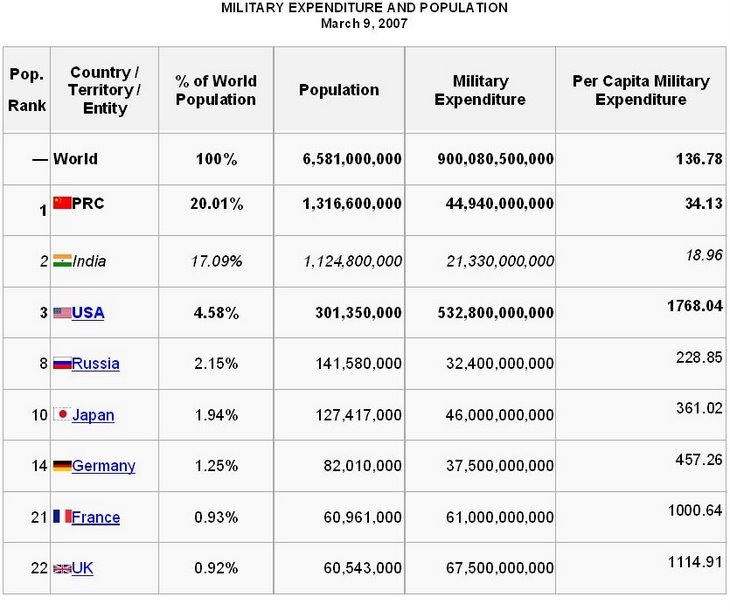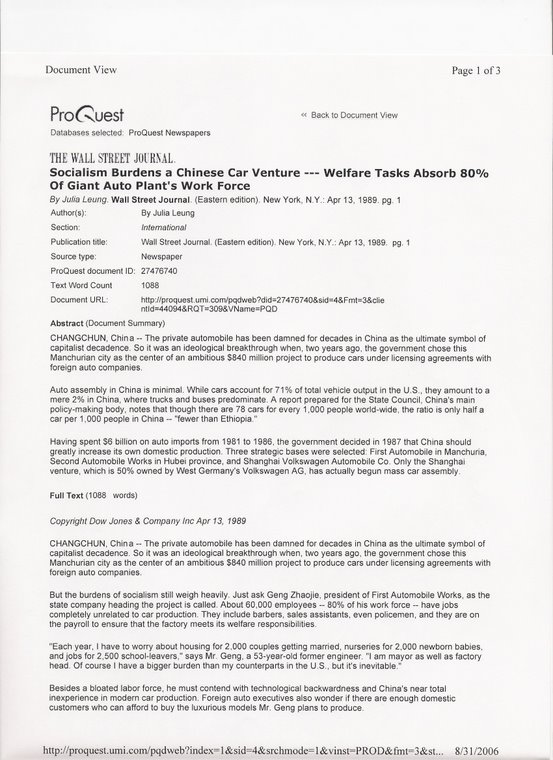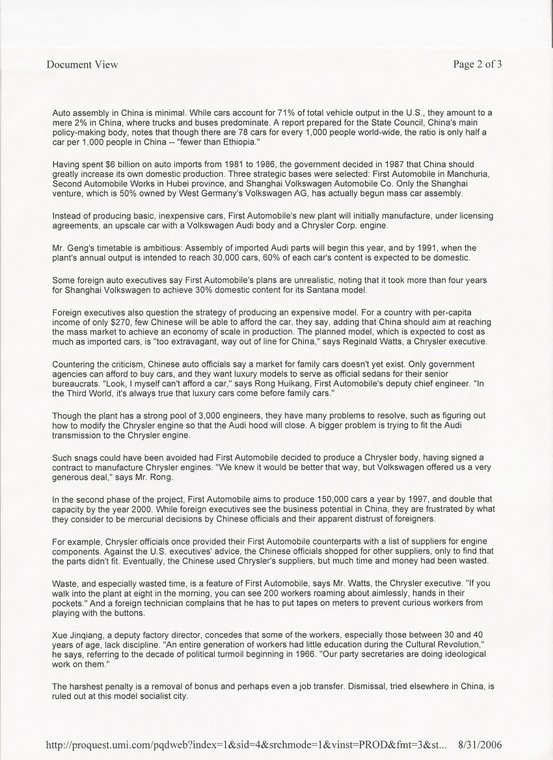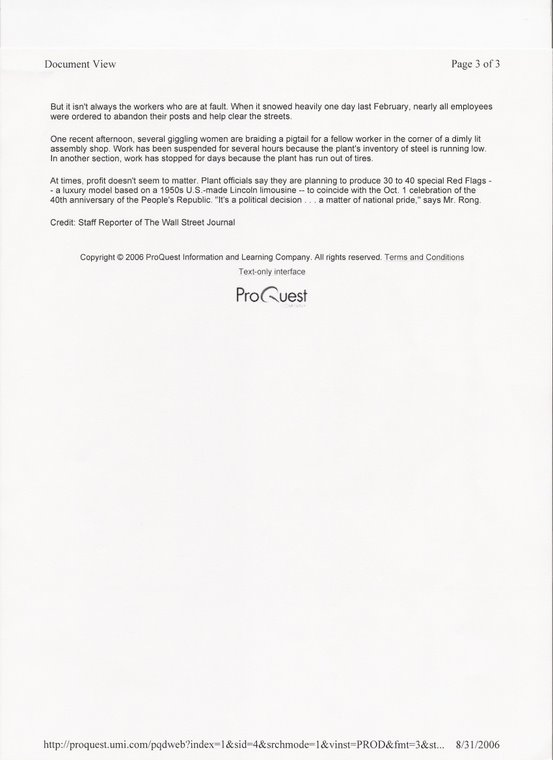Friday, August 15, 2008
Corporate complicity with the Great Firewall
Question: Does anyone really believe this is not happening in the United States, too?
Comment: Alan Greenspan, the "guru" of "free markets," says free markets work best without government interference; but, it seems that these "free markets" fear the people whether in China or the United States and it takes massive government involvement to protect these "free markets" from being replaced with the planned economy of socialism. It seems the only time the "free marketeers" don't complain about government interference and involvement is when it takes government to protect the "free market" from the wrath of the people who are fed up with "free markets."
Corporate complicity with the Great Firewall
http://www.guardian.co.uk/commentisfree/2008/aug/13/china.censorship
China is strongly criticised for its internet censorship – but it is western technology firms that have provided the tools for the job
Dmitri Vitaliev guardian.co.uk,
Wednesday August 13 2008 11:00
Like its precursor, the Great Wall of China, the Great Firewall was constructed to guard China from waves of foreign influence and information intrusion. With the world's spotlight on China and widespread criticism of its repressive actions, one should not forget that the knowledge and technology used to create the world's most prominent Big Brother society was designed in the west, often by the very same corporations whose advertisements on TV take up the time between the relay race and the javelin competition.
Much more than your standard internet filtering gateway, the Great Firewall comprises an administrative collaboration of seven government ministries, unrestricted access to numerous public record databases, closed circuit television footage with built-in facial recognition systems, as well as the more well-known information surveillance and censorship technology. Software and hardware purchased from around the world continue to tighten the screws of a digital information society. Network control and optimisation, intrusion detection and other security features promised in the product brochures of western IT firms are put to use against the rights to privacy and freedom of an entire populace. This is a brief survey of the surveillance scene:
A recent (non-intrusive) scan through the website of the Chinese Ministry of Public Security revealed a number of documents listing an inventory of various security technologies. One spreadsheet details software and hardware implemented for network surveillance, packet scanning and user detection. A closer inspection reveals that the Chinese internet infrastructure employs a huge array of security products, procured from companies all around the world. An example of four tools, chosen from the several hundred found in the inventory:
XSGuard Management System: purchased from the Els Shield (Shanghai) Information Technology Co Ltd, network management software developed in the Netherlands. It allows for monitoring of network packets and performing digital forensics.
Cisco 4125 Intrusion Detection System: purchased from Cisco China and used for monitoring activity on the T1 subnet. Other items sold include the ASA 5505, which "provides intelligent threat defense and secure communications services that stop attacks before they impact business continuity."
YangNet Police Network Intrusion Detection System: purchased from the Bright Oceans Corporation in China. According to their (badly translated) website, the product "acts in a transparent based on a URL filtering and text content filtering, shielding bad, illegal site, on the conduct of fine-grained web content filtering and the precise control and prevent all internal net users to browse the cult, pornography and other undesirable foreign websites and webpages. This feature is suitable for primary and secondary schools, tertiary institutions, government, business and professional applications."
Radware DefensePro 2000: an Israeli technology organisation; in this case, the product offers an "Adaptive Decision Engine: behaviour-based, self-learning mechanism proactively scans for anomalous network, server and client traffic patterns ... and is designed for enterprise core and perimeter deployment, data centers, university campuses and carrier backbones."
A popular acronym in government, big business and the military for today's centralised surveillance technologies is "C4I" (Command, Control, Communications, Computers and Intelligence). The top shelf of the technology market offers solutions that integrate closed circuit television with criminal records databases, national health insurance with biometric ID cards, holiday travel bookings with international terrorist lists and so on.
Security China 2000, the largest national security exhibition, attended by the world's most renowned IT corporations, marked a beginning of Chinese endeavours to create the world's most sophisticated surveillance infrastructure. It was sponsored by the Chinese Public Security Bureau, the ministry in charge of policing the internet. The meeting was attended by US-based Lucent, Sun Microsystems and Cisco, European wireless giants Nokia and Ericsson, and Canada's Nortel Networks, among many others. The main event was China's Golden Shield Project – an ambitious plan to link China's national and internet surveillance networks, public record databases, CCTV cameras, speech and face recognition databases, smart cards, credit records and a myriad of regional and national ministries. Their mission was to make the network "see, hear and think" in the continuing effort to solidify state control.
Nortel Networks continues to work with the Chinese Tsinghua University on developing speech recognition software, often used in surveillance of telephone conversations, allowing the network to hear. It has also widely distributed its "personal internet suite" to providers in Shanghai, Beijing and other major Chinese cities. The software allows IPs not only to monitor what their subscribers are doing online, but to control what information is delivered to them.
Content requested from a home computer for topics deemed undesirable will be stored against that person's personal file in numerous databases. The network rolled out with product and knowledge support from western IT firms is designed to think – that is, to identify individual subscribers when they log on, matching names to IP addresses, and learning, over time, what interests them.
The Golden Shield Project also integrates a facial recognition system (FRS), partly developed by Acsys Biometrics, a Canadian company. Rolled out across closed-circuit video surveillance networks in Chinese cities, it allows the Golden Shield to see. Rick Collins, senior manager of Nortel's advanced research laboratory, ProtoNet, said of the Acsys system: "Layering Acsys' face recognition's capabilities within Nortel Networks' solutions will make communication networks more personal. I envision a network that knows who you are, where you are and can reach you whether you're on your mobile phone or at your desktop."
An enthusiastic business partner of the Chinese state apparatus has been Cisco. Notorious for its several appearances before the US House of Representatives to explain their role in supplying virtually the entire hardware on which the Golden Shield Project operates, as well as multiple systems to assist Chinese ministries responsible for catching political and social dissidents and censoring the internet. In 1997, Cisco won the contract to supply internet "firewall boxes" and, by 2006, they supplied 60% of the Chinese market for routers, switches and other sophisticated networking gear. Its estimated annual revenue from China is $500m.
In 2003, Cisco's "Policenet" software was rolled out as the backbone of the Chinese state security system. This software, in conjunction with Intel's fingerprint technology, is compatible with the Chinese surveillance systems and allows a policeman stopping a person on the street to scan that person's ID card and access instantly the individual's past political and social behaviour, family history and recent internet activity.
Terry Alberstein, director of corporate affairs for Cisco Systems (Asia Pacific), confirmed in 2005 that Cisco does indeed sell networking and telecommunications equipment directly to the Public Security Bureau and other law enforcement offices throughout China. Cisco recently stated that it also provides service and training to Chinese police officials. Unlike other IT companies, Cisco has signed contracts directly with Chinese public security authorities.
It is futile to argue whether western corporations are directly responsible for the uses to which China puts their technologies. Following basic free-trade principles, products are most likely sold "as is" to (rather than customised for) the Chinese government or third-party resellers. However, just as in the arms trade, these practices have led to the creation of a hostile digital environment, inhabited by Da Ge (pinyin for Big Brother). Whenever we pause to discuss or protest China's decision to filter websites or jail Yahoo email account holders, we must bear in mind that the technology that has made this possible was built in our own backyard.
Comment: Alan Greenspan, the "guru" of "free markets," says free markets work best without government interference; but, it seems that these "free markets" fear the people whether in China or the United States and it takes massive government involvement to protect these "free markets" from being replaced with the planned economy of socialism. It seems the only time the "free marketeers" don't complain about government interference and involvement is when it takes government to protect the "free market" from the wrath of the people who are fed up with "free markets."
Corporate complicity with the Great Firewall
http://www.guardian.co.uk/commentisfree/2008/aug/13/china.censorship
China is strongly criticised for its internet censorship – but it is western technology firms that have provided the tools for the job
Dmitri Vitaliev guardian.co.uk,
Wednesday August 13 2008 11:00
Like its precursor, the Great Wall of China, the Great Firewall was constructed to guard China from waves of foreign influence and information intrusion. With the world's spotlight on China and widespread criticism of its repressive actions, one should not forget that the knowledge and technology used to create the world's most prominent Big Brother society was designed in the west, often by the very same corporations whose advertisements on TV take up the time between the relay race and the javelin competition.
Much more than your standard internet filtering gateway, the Great Firewall comprises an administrative collaboration of seven government ministries, unrestricted access to numerous public record databases, closed circuit television footage with built-in facial recognition systems, as well as the more well-known information surveillance and censorship technology. Software and hardware purchased from around the world continue to tighten the screws of a digital information society. Network control and optimisation, intrusion detection and other security features promised in the product brochures of western IT firms are put to use against the rights to privacy and freedom of an entire populace. This is a brief survey of the surveillance scene:
A recent (non-intrusive) scan through the website of the Chinese Ministry of Public Security revealed a number of documents listing an inventory of various security technologies. One spreadsheet details software and hardware implemented for network surveillance, packet scanning and user detection. A closer inspection reveals that the Chinese internet infrastructure employs a huge array of security products, procured from companies all around the world. An example of four tools, chosen from the several hundred found in the inventory:
XSGuard Management System: purchased from the Els Shield (Shanghai) Information Technology Co Ltd, network management software developed in the Netherlands. It allows for monitoring of network packets and performing digital forensics.
Cisco 4125 Intrusion Detection System: purchased from Cisco China and used for monitoring activity on the T1 subnet. Other items sold include the ASA 5505, which "provides intelligent threat defense and secure communications services that stop attacks before they impact business continuity."
YangNet Police Network Intrusion Detection System: purchased from the Bright Oceans Corporation in China. According to their (badly translated) website, the product "acts in a transparent based on a URL filtering and text content filtering, shielding bad, illegal site, on the conduct of fine-grained web content filtering and the precise control and prevent all internal net users to browse the cult, pornography and other undesirable foreign websites and webpages. This feature is suitable for primary and secondary schools, tertiary institutions, government, business and professional applications."
Radware DefensePro 2000: an Israeli technology organisation; in this case, the product offers an "Adaptive Decision Engine: behaviour-based, self-learning mechanism proactively scans for anomalous network, server and client traffic patterns ... and is designed for enterprise core and perimeter deployment, data centers, university campuses and carrier backbones."
A popular acronym in government, big business and the military for today's centralised surveillance technologies is "C4I" (Command, Control, Communications, Computers and Intelligence). The top shelf of the technology market offers solutions that integrate closed circuit television with criminal records databases, national health insurance with biometric ID cards, holiday travel bookings with international terrorist lists and so on.
Security China 2000, the largest national security exhibition, attended by the world's most renowned IT corporations, marked a beginning of Chinese endeavours to create the world's most sophisticated surveillance infrastructure. It was sponsored by the Chinese Public Security Bureau, the ministry in charge of policing the internet. The meeting was attended by US-based Lucent, Sun Microsystems and Cisco, European wireless giants Nokia and Ericsson, and Canada's Nortel Networks, among many others. The main event was China's Golden Shield Project – an ambitious plan to link China's national and internet surveillance networks, public record databases, CCTV cameras, speech and face recognition databases, smart cards, credit records and a myriad of regional and national ministries. Their mission was to make the network "see, hear and think" in the continuing effort to solidify state control.
Nortel Networks continues to work with the Chinese Tsinghua University on developing speech recognition software, often used in surveillance of telephone conversations, allowing the network to hear. It has also widely distributed its "personal internet suite" to providers in Shanghai, Beijing and other major Chinese cities. The software allows IPs not only to monitor what their subscribers are doing online, but to control what information is delivered to them.
Content requested from a home computer for topics deemed undesirable will be stored against that person's personal file in numerous databases. The network rolled out with product and knowledge support from western IT firms is designed to think – that is, to identify individual subscribers when they log on, matching names to IP addresses, and learning, over time, what interests them.
The Golden Shield Project also integrates a facial recognition system (FRS), partly developed by Acsys Biometrics, a Canadian company. Rolled out across closed-circuit video surveillance networks in Chinese cities, it allows the Golden Shield to see. Rick Collins, senior manager of Nortel's advanced research laboratory, ProtoNet, said of the Acsys system: "Layering Acsys' face recognition's capabilities within Nortel Networks' solutions will make communication networks more personal. I envision a network that knows who you are, where you are and can reach you whether you're on your mobile phone or at your desktop."
An enthusiastic business partner of the Chinese state apparatus has been Cisco. Notorious for its several appearances before the US House of Representatives to explain their role in supplying virtually the entire hardware on which the Golden Shield Project operates, as well as multiple systems to assist Chinese ministries responsible for catching political and social dissidents and censoring the internet. In 1997, Cisco won the contract to supply internet "firewall boxes" and, by 2006, they supplied 60% of the Chinese market for routers, switches and other sophisticated networking gear. Its estimated annual revenue from China is $500m.
In 2003, Cisco's "Policenet" software was rolled out as the backbone of the Chinese state security system. This software, in conjunction with Intel's fingerprint technology, is compatible with the Chinese surveillance systems and allows a policeman stopping a person on the street to scan that person's ID card and access instantly the individual's past political and social behaviour, family history and recent internet activity.
Terry Alberstein, director of corporate affairs for Cisco Systems (Asia Pacific), confirmed in 2005 that Cisco does indeed sell networking and telecommunications equipment directly to the Public Security Bureau and other law enforcement offices throughout China. Cisco recently stated that it also provides service and training to Chinese police officials. Unlike other IT companies, Cisco has signed contracts directly with Chinese public security authorities.
It is futile to argue whether western corporations are directly responsible for the uses to which China puts their technologies. Following basic free-trade principles, products are most likely sold "as is" to (rather than customised for) the Chinese government or third-party resellers. However, just as in the arms trade, these practices have led to the creation of a hostile digital environment, inhabited by Da Ge (pinyin for Big Brother). Whenever we pause to discuss or protest China's decision to filter websites or jail Yahoo email account holders, we must bear in mind that the technology that has made this possible was built in our own backyard.
Monday, August 11, 2008
One in Five German Firms Leaving China
SPIEGEL ONLINEInternational
WHEN OUTSOURCING FAILS
One in Five German Firms Leaving China
China lost its status as the world's cheapest country for manufacturing some time ago. The momentum now seems to be shifting away from outsourcing to the Far East, with one in five Germany companies pulling production out of the country. Chinese workers, they say, are getting too expensive.
Despite massive training efforts, German premium stuffed animal-maker Steiff was unable to yield the quality it demanded from its Chinese plant.
Citing fast-climbing labor costs and pesky production quality problems, a growing number of German companies are doing an about face and pulling their manufacturing operations out of China. Some are searching for countries with lower wages (more...) while others are returning production to Germany.
The Association of German Engineers (VDI) estimates that one in five of the approximately 1,600 German companies with presences in China is planning to pull out of the market, the Tagesspiegel am Sonntag newspaper reported. "Many, many firms are naïve when they enter into the Chinese market and don't even think about the fact that wages are increasing there," VDI spokesman Sven Renkel told the newspaper.
Rising energy costs, stricter environmental rules, the elimination of many tax incentives, a dearth of skilled workers and the increasing strength of the yuan against the dollar have all pushed production costs up in China. In addition, the country's 8-percent inflation rate has also driven up wages in the past year by as much as 20 percent, Harald Kayer, a partner at the consulting firm PricewaterhouseCoopers (PWC), told the paper. For some companies and industries, China is already getting to be too expensive. They're now looking to other lower-wage countries, like Bangladesh, India or Kazakhstan, where production is cheaper, or they're bringing manufacturing back to Germany, he said.
Chinese companies, too, are increasingly outsourcing production abroad, Eddy Henning, the head of corporate banking at Deutsche Bank in Beijing, told the newspaper. "Someone who just wants to produce T-shirts is more likely to go to Vietnam or Africa," he said. For investors from Europe, Romania and Bulgaria are also competitive with China when it comes to production.
According to Hans Röhm of the consulting firm Deloitte, the companies that are most likely to return to Germany are those that outsourced production out of cost considerations -- including the consumer goods industry and textiles, which both produce in mass quantities.
But manufacturers of high-quality goods are also looking at China with a more critical eye -- at least in the longterm. A dip in quality for these companies could damage their reputation. "That's why we're advising a lot of our customers to consider production in Germany," Röhm told the paper.
Four years ago, Steiff, a world-famous German company that makes high-quality teddy bears, moved part of its production to China. In early July, though, the company announced it would return all manufacturing to Germany.
"For premium products, China is just incalculable," Steiff CEO Martin Frenchen told the Stuttgarter Nachrichten newspaper in July. He said it took six months to train workers to produce the teddy bears' complicated stitching and to meet the company's standards for quality. "By then you might have already lost them to an automobile factory next door that pays more," he added. Despite the company's arduous efforts to produce high quality products in China, Steiff executives weren't satisfied with the end result, Frechen said.
The company also complained of the length of delivery times. Sometimes the ships carrying the company's stuffed animals would take up to three months to get to Germany. For sales successes like the company's stuffed Knut polar bear, of which 80,000 were sold, that waiting period was just too long.
Following a major scandal last year in which researchers discovered that some toys made in China were coated in toxic lead paint, the public's faith in production in the country was shaken, and Steiff decided to end its production in Asia.
Commentary:
WHEN OUTSOURCING FAILS
One in Five German Firms Leaving China
China lost its status as the world's cheapest country for manufacturing some time ago. The momentum now seems to be shifting away from outsourcing to the Far East, with one in five Germany companies pulling production out of the country. Chinese workers, they say, are getting too expensive.
Despite massive training efforts, German premium stuffed animal-maker Steiff was unable to yield the quality it demanded from its Chinese plant.
Citing fast-climbing labor costs and pesky production quality problems, a growing number of German companies are doing an about face and pulling their manufacturing operations out of China. Some are searching for countries with lower wages (more...) while others are returning production to Germany.
The Association of German Engineers (VDI) estimates that one in five of the approximately 1,600 German companies with presences in China is planning to pull out of the market, the Tagesspiegel am Sonntag newspaper reported. "Many, many firms are naïve when they enter into the Chinese market and don't even think about the fact that wages are increasing there," VDI spokesman Sven Renkel told the newspaper.
Rising energy costs, stricter environmental rules, the elimination of many tax incentives, a dearth of skilled workers and the increasing strength of the yuan against the dollar have all pushed production costs up in China. In addition, the country's 8-percent inflation rate has also driven up wages in the past year by as much as 20 percent, Harald Kayer, a partner at the consulting firm PricewaterhouseCoopers (PWC), told the paper. For some companies and industries, China is already getting to be too expensive. They're now looking to other lower-wage countries, like Bangladesh, India or Kazakhstan, where production is cheaper, or they're bringing manufacturing back to Germany, he said.
Chinese companies, too, are increasingly outsourcing production abroad, Eddy Henning, the head of corporate banking at Deutsche Bank in Beijing, told the newspaper. "Someone who just wants to produce T-shirts is more likely to go to Vietnam or Africa," he said. For investors from Europe, Romania and Bulgaria are also competitive with China when it comes to production.
According to Hans Röhm of the consulting firm Deloitte, the companies that are most likely to return to Germany are those that outsourced production out of cost considerations -- including the consumer goods industry and textiles, which both produce in mass quantities.
But manufacturers of high-quality goods are also looking at China with a more critical eye -- at least in the longterm. A dip in quality for these companies could damage their reputation. "That's why we're advising a lot of our customers to consider production in Germany," Röhm told the paper.
Four years ago, Steiff, a world-famous German company that makes high-quality teddy bears, moved part of its production to China. In early July, though, the company announced it would return all manufacturing to Germany.
"For premium products, China is just incalculable," Steiff CEO Martin Frenchen told the Stuttgarter Nachrichten newspaper in July. He said it took six months to train workers to produce the teddy bears' complicated stitching and to meet the company's standards for quality. "By then you might have already lost them to an automobile factory next door that pays more," he added. Despite the company's arduous efforts to produce high quality products in China, Steiff executives weren't satisfied with the end result, Frechen said.
The company also complained of the length of delivery times. Sometimes the ships carrying the company's stuffed animals would take up to three months to get to Germany. For sales successes like the company's stuffed Knut polar bear, of which 80,000 were sold, that waiting period was just too long.
Following a major scandal last year in which researchers discovered that some toys made in China were coated in toxic lead paint, the public's faith in production in the country was shaken, and Steiff decided to end its production in Asia.
Commentary:
This headline in Spiegel says it all:
Vietnam is the New China: Globalization's Victors Hunt for the Next Low-Wage Country (05/14/2008)
Through it all, the working class creates the wealth and the capitalists steal this wealth.
The question remains: What is to be done?
With one in five German firms now leaving China for cheaper labor and better quality production standards what will happen as firms from other countries follow in quest of cheaper labor markets?
Is China really on the path of "harmonious development?" Or, is this "harmonious development" just a sop--- or mere words and platitudes in the form concessions--- thrown out to pacify billions of working class people and the peasantry who are growing tired of living in poverty?
The creation of millions of capitalists has been tolerated by the capitalist moles who have tunneled their way into the Communist Party of China; these capitalist moles are out to restore capitalism in China under the guise of harmonious development.
These capitalist moles who have infiltrated the Communist Party of China are seeking to buy time to finish consolidating the return of capitalism to full power by suggesting that working people will only be able to look forward to reforms twenty to one-hundred years from now.
The facts simply do not correspond to reality in China. China has in fact become a tremendously wealthy nation... in spite of claims of being on the road to "harmonious development" the only ones living "harmonious" lives are the new Chinese capitalists.
No working class Communist Party would tolerate this tremendous accumulation by capitalists who flaunt their wealth in front of the poor and then tell workers and peasants they will have to wait twenty to one-hundred years to have all of this benefit their lives.
At a bare minimum, if there was any sincerity at all about working toward "harmonious development," all previously cut universal social programs would have been restored by now in China. For sure there is enough wealth in the hands of Chinese and foreign capitalists to finance socialized health care and free education through university along with a very substantial housing program amounting to more than the "dormitory" housing for which working people have to pay exorbitant rents.
Going back-wards for another twenty to one-hundred years as capitalists amass ever greater profits through the suffering of the working class and rural peasantry is not my idea of what socialism is about.
Already, the very capitalists who have amassed very significant wealth in China are doing just what capitalists in any other countries have done... they are taking this wealth and running to cheap labor markets where they can make even more. This is not "harmonious development" no matter what anyone claims.
Working people have a right to ask if the wealth they have created amounts to enough for them to live better lives.
Commentary by Alan L. Maki
Subscribe to:
Comments (Atom)











